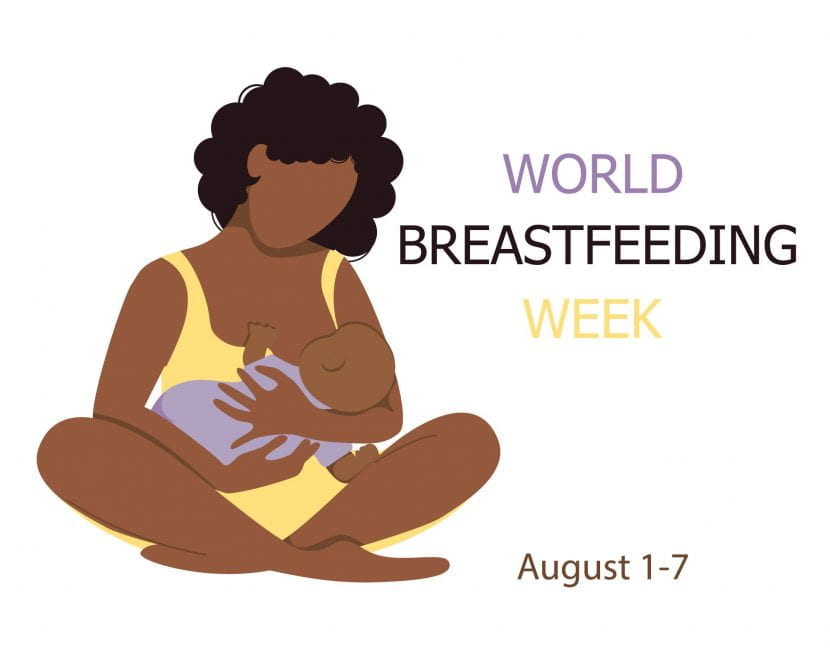The first week in August each year is a time to celebrate breastfeeding! Let us celebrate by learning about the four main stages of breastfeeding. Learning about these stages could help you as a future or current parent, and for those that support family, friends, co-workers, or community members with breastfeeding. The stages are learn, start, overcome, and thrive.
Learn
- Breastfeeding Benefits-
- Breastfeeding benefits both mother and baby. The baby benefits by a lower risk of diseases, infections, diabetes, obesity, diarrhea, and so on. The mother benefits by recovering faster from childbirth and reduction in the risk of breast and ovarian cancer and type 2 diabetes. Another benefit is breastfeeding is free and requires no equipment or preparation! Breastfeeding can lower the parents worry about nutrition. Breast milk provides adequate vitamins, minerals, and the nutrients the baby needs to grow and develop.
- Breastfeeding Basics-
- Due to the small size of a babies’ stomach, you must feed them often in small amounts, this could mean 8-12 times in 24-hours. A common concern for breastfeeding is how to know the baby is getting enough milk. The easiest way to know is the color, texture, and frequency of soiled diapers, along with weight trends.
- Our bodies can do amazing things, including making breast milk! Breasts prepare for breastfeeding during pregnancy and then hormones, such, as prolactin, are released after birth which stimulates milk production. Oxytocin is a hormone that is released when a baby suckles resulting in breast milk moving through the milk ducts, also known as the let-down reflex. Increase in nursing or pumping will result in a increase in the total milk produced.
- Challenges-
- Although breastfeeding a natural process and the baby will know how to nurse, challenges are common. It is important to know what to expect and how to overcome the challenges. Common challenges include sore nipples, low milk supply, engorgement, plugged duct, exhaustion, and emotional feelings. The main takeaway message is to know challenges may occur and to know where you can get support. Support may include healthcare providers, WIC, family, and friends.
- Much more!
- There is so much to learn about breastfeeding! If you are interested in learning more, talk to your local WIC or Cornell Cooperative Extension office. Additional information can also be found here: https://wicbreastfeeding.fns.usda.gov/learn
Start
- Start breastfeeding! It is important to start breastfeeding as soon as possible after the birth of a baby. One idea is to check with your hospital or birthing center prior to giving birth to ensure they have a Certified Lactation Consultant on staff to assist with breastfeeding.
- Within the first few days after birth, your milk will begin to transition from colostrum to mature milk. Your baby will likely not have a set feeding routine and will want to eat when he/she is hungry. It is important to recognize early feeding cues, such as fists moving to mouth, head looking for breast, sucking on hands, lip smacking, and opening and closing mouth. Crying can be a late sign of hunger and will be more challenging to feed at this stage.
- As the parent(s) navigate through all of their ‘firsts” with breastfeeding, it is important to know where to find support and resources, including your healthcare provider, WIC, Cornell Cooperative Extension, family, and friends. Do not be afraid to ask for help!
Overcome
- As mentioned, there are challenges with breastfeeding. However, it is important to know that you can overcome these challenges to continue with breastfeeding.
- Know that you are never alone with breastfeeding. Support is available to help you overcome challenges to support your baby in thriving.
Thrive
- Be proud! Be proud if you are currently breastfeeding, have breastfeed in the past, and/or provide support to those that are breastfeeding. Breastfeeding helps the baby thrive and will benefit them for the rest of their lives. No matter what role you play, be proud of yourself for helping a baby thrive.
Resource:

